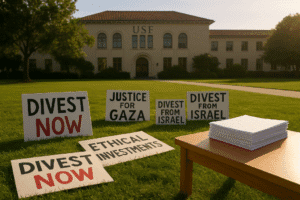Divestment Shock: 5 Powerful Reasons USF’s Israel Exit Marks a Historic Win for Campus Activism
The University of San Francisco (USF) has agreed to divest from four U.S. defense companies—Palantir, L3Harris, GE Aerospace, and RTX Corporation—linked to Israel’s military operations in Gaza, marking a rare victory for student activists after 18 months of protests. The decision, affecting less than 0.5% of USF’s $566 million endowment, follows sustained pressure from Students for Justice in Palestine, who organized encampments, protests, and a library sit-in to demand accountability.
While the financial impact is minimal, the move symbolizes a growing push for universities to confront ties to global conflicts. USF framed the shift as part of a broader policy to invest in index funds, avoiding direct stakes in contentious firms. The win echoes past divestment campaigns, such as those targeting apartheid South Africa, but remains contentious, with critics labeling such efforts antisemitic. Activists, however, emphasize their focus on opposing militarism, not singling out Israel, and vow to push for further cuts to academic partnerships with Israel. The outcome underscores the power of strategic, relentless student organizing in reshaping institutional policies, even as debates over ethics, free speech, and investment transparency continue to divide campuses nationwide.

Divestment Shock: 5 Powerful Reasons USF’s Israel Exit Marks a Historic Win for Campus Activism
The University of San Francisco (USF) has become an unlikely battleground for a significant shift in higher education’s role in global conflicts. After 18 months of relentless student protests, the university announced it will divest from four U.S. defense companies—Palantir, L3Harris, GE Aerospace, and RTX Corporation—tied to Israel’s military operations in Gaza. While the financial impact is small (less than 0.5% of its $566 million endowment), the symbolic victory underscores a growing wave of student-led movements demanding institutional accountability in an era of heightened social consciousness.
The Anatomy of a Student-Led Victory
USF’s decision didn’t happen overnight. Students for Justice in Palestine (SJP) employed a multi-pronged strategy:
- Sustained Pressure: Protests, encampments, and occupying campus spaces, including a library renamed to honor a slain Gazan journalist.
- Strategic Dialogue: Months of negotiations with administrators, leveraging USF’s existing Socially Responsible Investment Task Force.
- Escalation Tactics: A final push with a library sit-in, which activists claim forced the university to disclose its February divestment decision.
The university, however, insists the move was part of a deliberate policy shift toward index funds, avoiding direct investments in contentious firms. This pivot allows USF to sidestep future controversies while aligning with its Jesuit values of social justice—a nuanced compromise between activism and institutional pragmatism.
Why These Companies?
The targeted firms are key players in defense tech:
- Palantir: Provides AI-driven surveillance systems used in Israeli military operations.
- RTX (Raytheon): Supplies precision-guided missiles.
- L3Harris & GE Aerospace: Manufacture communications systems and aircraft engines integral to modern warfare.
Critics argue divestment is largely symbolic, given the minimal financial stake. Yet activists counter that symbolism matters—it challenges universities to confront complicity in conflict and reshapes norms around ethical investing.
A Broader Trend Meets Resistance
USF joins a small club of schools, like San Francisco State, heeding divestment calls. Most universities, however, reject such demands, citing complexities in endowment management or accusations of antisemitism. Brown and UC Berkeley, for instance, debated similar measures but declined to act.
The debate mirrors past movements, like 1980s South Africa divestment campaigns, yet diverges in its polarization. Pro-Israel advocates claim singling out Israel fosters campus hostility toward Jewish students. USF activists, meanwhile, frame their fight as anti-war, not anti-Jewish—a distinction the university cautiously navigated by focusing on “ethical considerations” rather than taking a geopolitical stance.
What’s Next for Campus Activism?
USF’s SJP chapter isn’t resting. They demand broader cuts to academic partnerships with Israel and sanctuary protections for pro-Palestinian students. Their persistence reflects a generational shift: today’s students view institutional accountability as non-negotiable, blending grassroots protest with savvy engagement of governance structures (e.g., task forces).
Yet challenges loom. Divestment’s tangible impact on Israel’s military operations is debatable, and universities increasingly shield endowments through opaque index funds. Still, as Ani De Lira Lopez, a USF junior, notes: “This win proves change is possible. But Gaza is still starving—we can’t stop here.”
The Bigger Picture
USF’s move is a microcosm of a wider reckoning. As global conflicts play out on campuses, students are rewriting the playbook for activism—prioritizing endurance, strategic escalation, and moral persuasion. While critics question divestment’s efficacy, its power lies in reshaping institutional identities and fueling broader conversations about justice. In an age where universities are both battlegrounds and brokers of social change, USF’s story is a testament to the enduring relevance—and complexity—of student voices.
You must be logged in to post a comment.